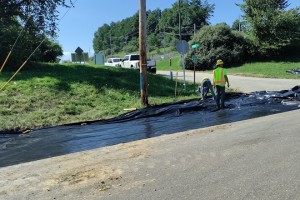UPDATE ~ Ohioans Skeptical That More Fracking Will Bring Benefits
New polling shows nearly two-thirds of Ohioans are opposed or unsure about fracking
From an Article by Nadia Ramlagan, Ohio News Service, August 1, 2023

Clean-up of an August 2021 fracking waste spill near Barnesville, Ohio didn't begin until three days later
House Bill 507 was signed into law by Gov. Mike DeWine this year and requires the state to approve permits for oil and gas leasing on state-owned land.
Ben Hunkler, communications manager for the Ohio River Valley Institute, said Ohioans are skeptical of potential economic benefits of the fracking boom, noting many communities have not seen the kinds of jobs or prosperity often touted by proponents of natural gas development.
“Ohio has one of the lowest severance tax rates in the nation,” Hunkler pointed out. “Meaning that the revenue that it derives from oil and gas extraction relative to other states is really low.”
When asked about the most important priority for addressing Ohio’s energy needs, 63% of Ohioans brought up developing more renewable-energy resources, such as wind and solar, according to a George Mason University/Climate Nexus poll. A majority said increasing domestic production of renewable energy is more likely to produce a greater number of good jobs in the state than increasing domestic production of fossil fuels.
Hunkler added nearly two-thirds of Ohioans said they are worried about the effects of climate change. “This polling also shows that majorities of Ohioans are concerned about air pollution, pollution of rivers, lakes and streams and climate change,” Hunkler outlined. “Which are all documented threats of fracking.”
According to the Yale School of the Environment, health effects increasingly linked to living near fracking include cancer, low birth weight, disruptions to the endocrine system, nose bleeds, headaches, and nausea.
#######+++++++#######+++++++#######
SEE ALSO ~ Fracking Chemicals Pose Health Risks for 18 Million Americans, Northeastern University News Service, April 27, 2023
What amount of dangerous chemicals used in fracking go unreported? More than scientists imagined!
The U.S. Congress excluded oil- and gas-related activities from federal regulation under the Safe Drinking Water Act in 2005 in the new National Energy Policy Act. Unless there is a state requirement, companies are not required to disclose chemicals that they use in fracking, which otherwise would have been regulated by the Environmental Protection Agency. Currently, only 28 states mandate disclosure, while others either don’t require it or suggest self-reporting.
The exemption became known as the Halliburton loophole because Dick Cheney, then vice president, was former chief executive officer of Halliburton, one of the largest players in the hydraulic fracturing market. Cheney supported the bill and it passed with bipartisan support. The study found that Halliburton is also the second-most-named direct supplier of chemicals regulated under Safe Drinking Water Act.
Fracking is also exempt from other flagship legislations such as the Clean Water Act, the Clean Air Act and Comprehensive Environmental Response, Compensation and Liability Act. “We think these results are really important and they should be more widely discussed.”